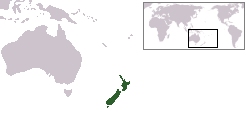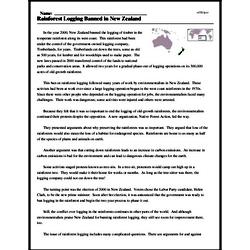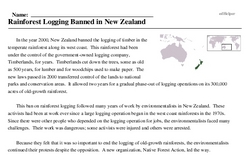Rainforest Logging Banned in New Zealand
In the year 2000, New Zealand banned the logging of timber in the temperate rainforest along its west coast. This rainforest had been under the control of the government-owned logging company, Timberlands, for years. Timberlands cut down the trees, some as old as 500 years, for lumber and for woodchips used to make paper. The new laws passed in 2000 transferred control of the lands to national parks and conservation areas. It allowed two years for a gradual phase-out of logging operations on its 300,000 acres of old-growth rainforest.
This ban on rainforest logging followed many years of work by environmentalists in New Zealand. These activists had been at work ever since a large logging operation began in the west coast rainforests in the 1970s. Since there were other people who depended on the logging operation for jobs, the environmentalists faced many challenges. Their work was dangerous; some activists were injured and others were arrested.
Because they felt that it was so important to end the logging of old-growth rainforests, the environmentalists continued their protests despite the opposition. A new organization, Native Forest Action, led the way.
They presented arguments about why preserving the rainforests was so important. They argued that loss of the rainforests would also mean the loss of a habitat for endangered species. Rainforests are home to as many as half of the species of plants and animals on earth.
Another argument was that cutting down rainforests leads to an increase in carbon emissions. An increase in carbon emissions is bad for the environment and can lead to dangerous climate changes for the earth.




